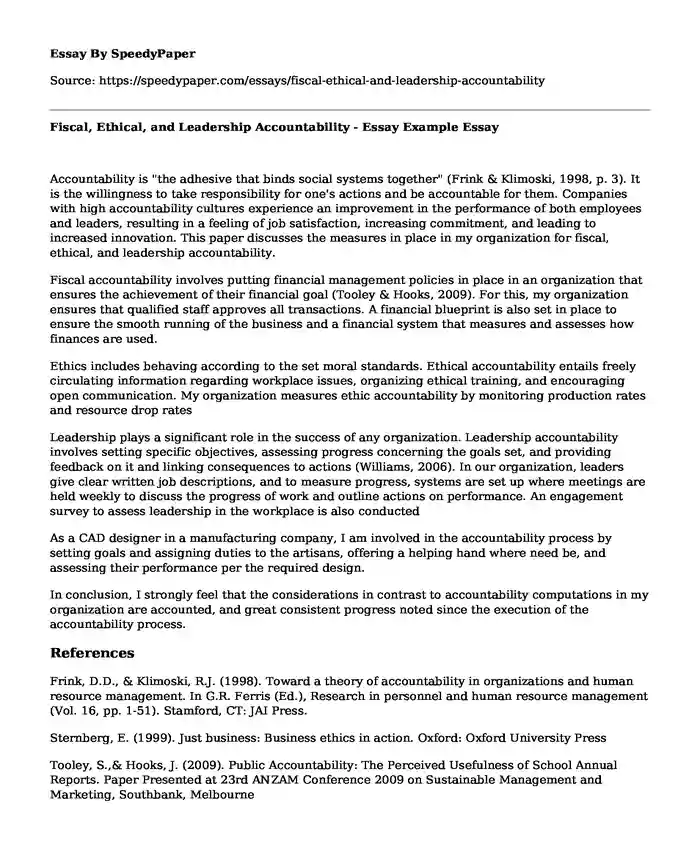
| Essay type: | Narrative essays |
| Categories: | Ethics Organizational behavior Organizational culture Leadership style |
| Pages: | 2 |
| Wordcount: | 411 words |
Accountability is "the adhesive that binds social systems together" (Frink & Klimoski, 1998, p. 3). It is the willingness to take responsibility for one's actions and be accountable for them. Companies with high accountability cultures experience an improvement in the performance of both employees and leaders, resulting in a feeling of job satisfaction, increasing commitment, and leading to increased innovation. This paper discusses the measures in place in my organization for fiscal, ethical, and leadership accountability.
Fiscal accountability involves putting financial management policies in place in an organization that ensures the achievement of their financial goal (Tooley & Hooks, 2009). For this, my organization ensures that qualified staff approves all transactions. A financial blueprint is also set in place to ensure the smooth running of the business and a financial system that measures and assesses how finances are used.
Ethics includes behaving according to the set moral standards. Ethical accountability entails freely circulating information regarding workplace issues, organizing ethical training, and encouraging open communication. My organization measures ethic accountability by monitoring production rates and resource drop rates
Leadership plays a significant role in the success of any organization. Leadership accountability involves setting specific objectives, assessing progress concerning the goals set, and providing feedback on it and linking consequences to actions (Williams, 2006). In our organization, leaders give clear written job descriptions, and to measure progress, systems are set up where meetings are held weekly to discuss the progress of work and outline actions on performance. An engagement survey to assess leadership in the workplace is also conducted
As a CAD designer in a manufacturing company, I am involved in the accountability process by setting goals and assigning duties to the artisans, offering a helping hand where need be, and assessing their performance per the required design.
In conclusion, I strongly feel that the considerations in contrast to accountability computations in my organization are accounted, and great consistent progress noted since the execution of the accountability process.
References
Frink, D.D., & Klimoski, R.J. (1998). Toward a theory of accountability in organizations and human resource management. In G.R. Ferris (Ed.), Research in personnel and human resource management (Vol. 16, pp. 1-51). Stamford, CT: JAI Press.
Sternberg, E. (1999). Just business: Business ethics in action. Oxford: Oxford University Press
Tooley, S.,& Hooks, J. (2009). Public Accountability: The Perceived Usefulness of School Annual Reports. Paper Presented at 23rd ANZAM Conference 2009 on Sustainable Management and Marketing, Southbank, Melbourne
Williams, C., 2006. Leadership accountability in a globalizing world. New York: Palgrave Macmillan
Cite this page
Fiscal, Ethical, and Leadership Accountability - Essay Example. (2023, Nov 14). Retrieved from https://speedypaper.com/essays/fiscal-ethical-and-leadership-accountability
Request Removal
If you are the original author of this essay and no longer wish to have it published on the SpeedyPaper website, please click below to request its removal:
- Free Essay Describing Leadership Style and Skills
- Essay Sample on Changes in the Hotel Industry
- Essay Sample on Work-Based Assessment
- Essay Sample: Theoretical Perspective and the Intervention Phase
- Essay Sample on Importance of Case Study
- Elevating Cafe Latteria: Navigating E-Commerce for Non-Profit Success in Auckland - Free Paper Sample
- Biological Context of Sex and Different Human Mate. Paper Example
Popular categories




